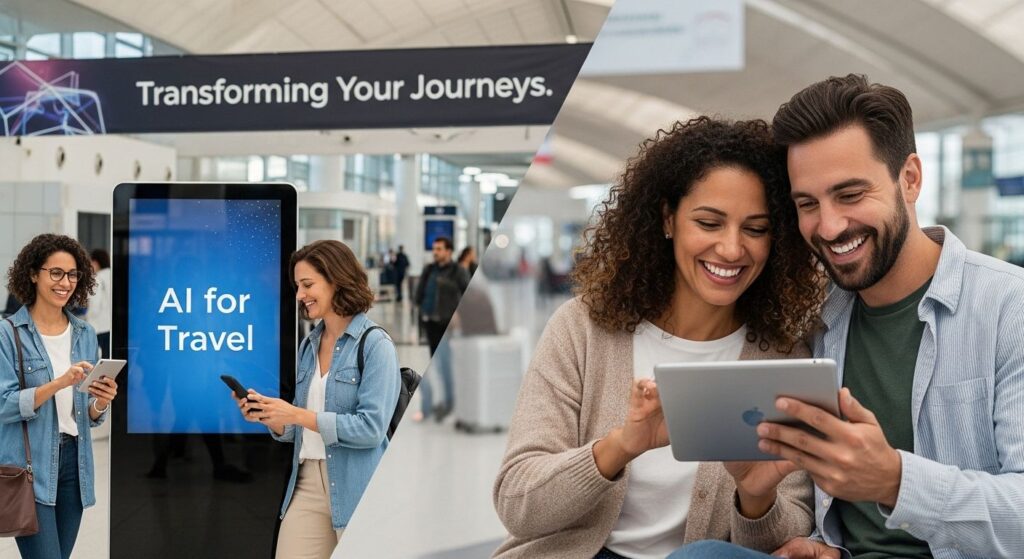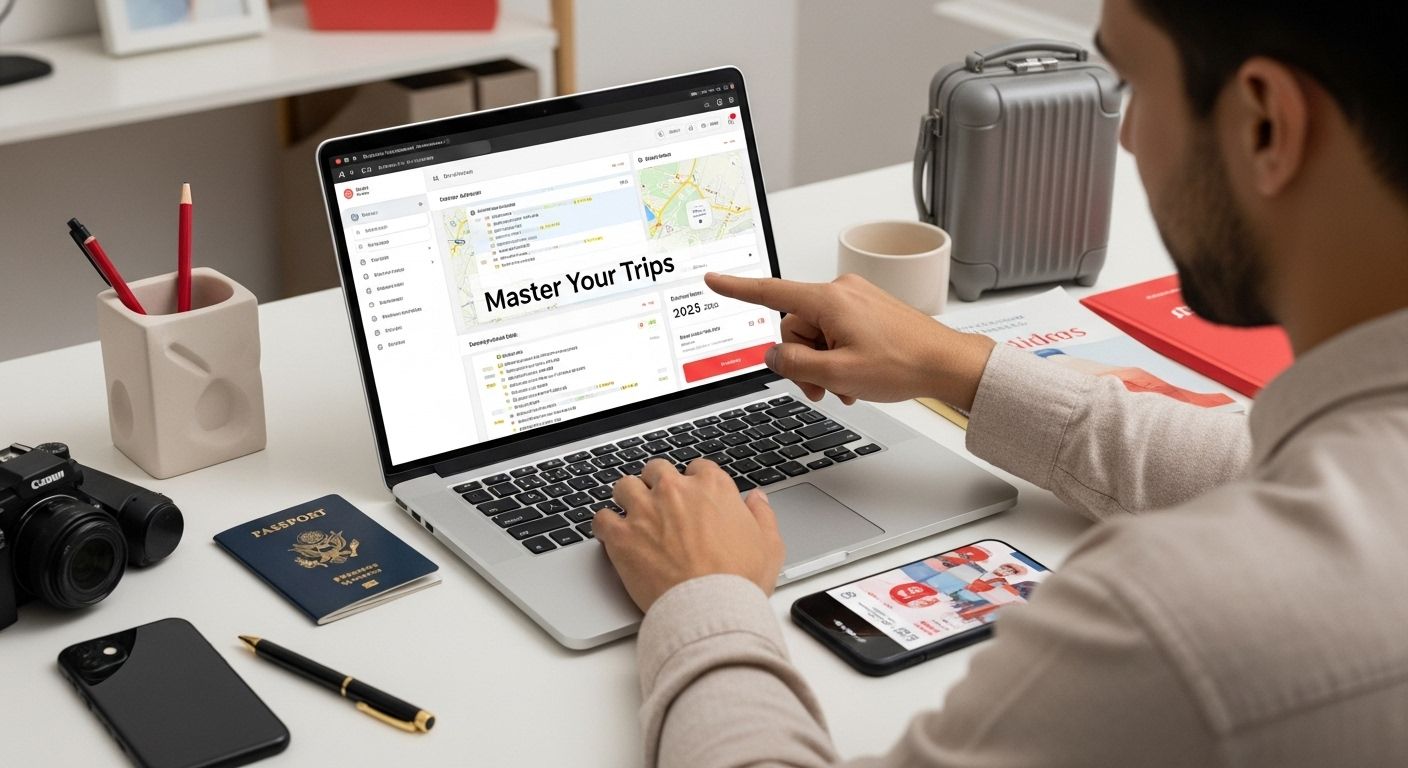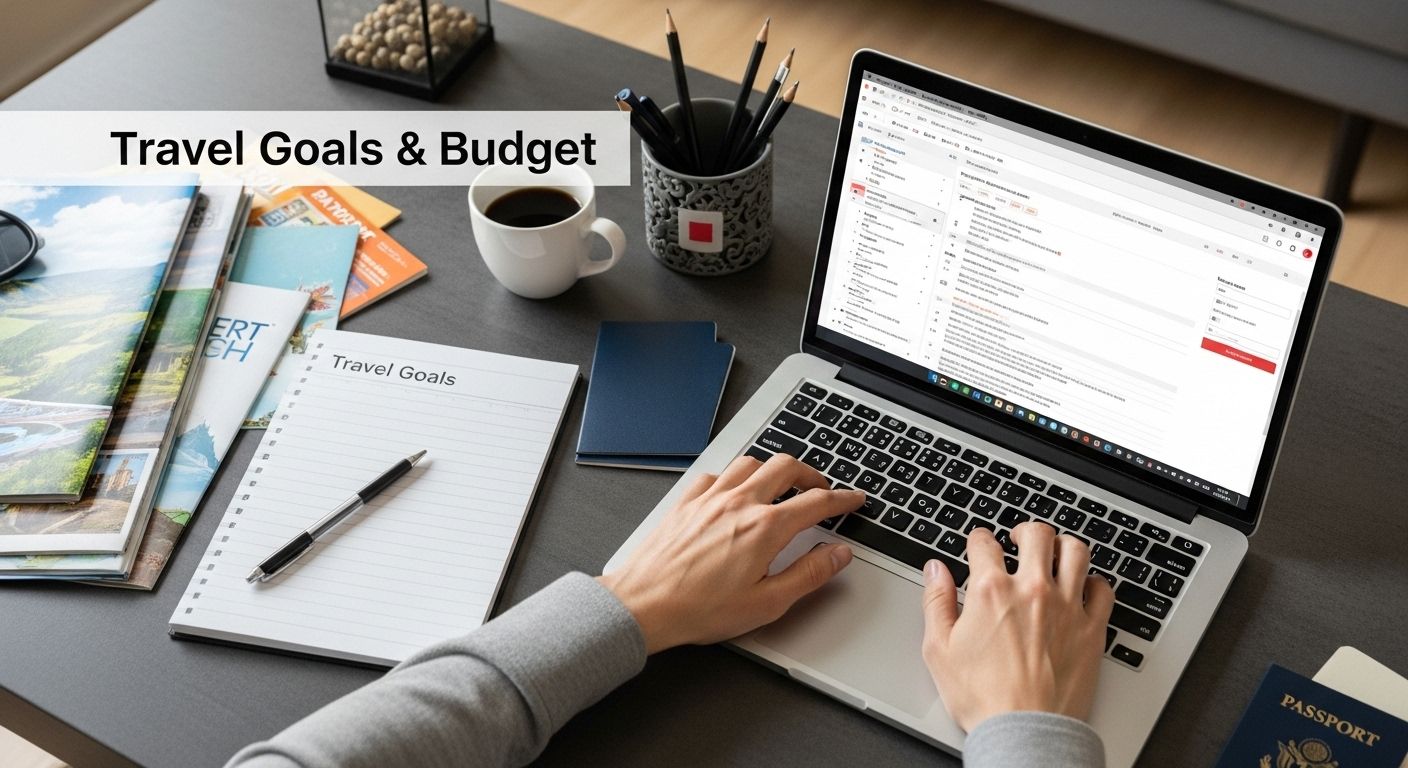AI is reshaping how people plan and experience travel, from booking flights to planning the perfect trip. Travelers now expect technology to understand their tastes and provide recommendations that feel tailor-made. But here is the surprising bit. AI-powered systems can build complete, personalized travel itineraries in under a minute by scanning thousands of data points at once. The real breakthrough is not just faster planning. It is that AI can predict needs travelers have not even mentioned yet.
Table of Contents
- What Is Ai For Travel And How Does It Work?
- The Importance Of Ai In Modern Travel Planning
- Key Technologies Behind Ai For Travel Solutions
- Real-World Applications Of Ai In Travel Experiences
- Future Trends: The Next Evolution Of Ai For Travel
Quick Summary
| Takeaway | Explanation |
|---|---|
| AI personalizes travel planning effortlessly | AI algorithms analyze individual preferences to create tailored travel experiences that enhance user satisfaction. |
| Efficiency speeds up the planning process | Algorithms quickly generate itineraries and optimize travel options, saving time that used to be spent on manual research. |
| Real-time support minimizes travel disruptions | AI systems provide instant updates and recommendations, effectively managing unexpected changes during trips. |
| Natural Language Processing enhances user interaction | AI technologies improve communication through chatbots and voice assistants, making travel planning more intuitive. |
| Future AI will transform travel experiences even further | Emerging technologies promise more immersive and personalized travel solutions that anticipate traveler needs proactively. |
What is AI for Travel and How Does It Work?
Artificial Intelligence (AI) for travel represents a groundbreaking technological approach that transforms how travelers plan, experience, and navigate their journeys. Unlike traditional travel planning methods, AI introduces intelligent systems capable of understanding complex traveler preferences, generating personalized recommendations, and solving travel challenges with unprecedented speed and accuracy.
The Core Mechanics of AI in Travel
AI for travel operates through sophisticated machine learning algorithms that analyze massive datasets from various sources. These systems collect and process information about destinations, user preferences, travel trends, real-time conditions, and historical travel patterns. By leveraging advanced neural networks, AI can generate intelligent insights that feel almost human-like in their precision and personalization.
The technology works through several key mechanisms:
- Data Collection: Gathering information from multiple sources like user profiles, booking histories, social media, and travel reviews
- Pattern Recognition: Identifying subtle connections and preferences that humans might overlook
- Predictive Modeling: Anticipating traveler needs before they are explicitly stated
Practical Applications in Travel Planning
According to research from the OECD, AI is revolutionizing multiple aspects of travel experiences. From personalized itinerary generation to real-time translation services, AI helps travelers navigate complex journeys with unprecedented ease.
Travel AI can now:
- Create customized trip plans based on individual interests
- Predict potential travel disruptions
- Recommend optimal routes and experiences
- Provide instant language translation and cultural insights
While the technology might seem complex, services like personalized travel recommendations are making AI more accessible and user-friendly for everyday travelers. The goal is not to replace human decision-making but to enhance and simplify the travel planning process.
This table highlights the key differences between traditional and AI-driven travel planning approaches, helping readers quickly see how technology transforms the experience.
| Aspect | Traditional Travel Planning | AI-Powered Travel Planning |
|---|---|---|
| Planning Speed | Hours or days of manual research | Itineraries generated in under a minute |
| Personalization | Generic, one-size-fits-all options | Tailored recommendations for each traveler |
| Adaptability | Relies on manual adjustments | Real-time updates and predictive adjustments |
| Customer Support | Call centers, limited hours | 24/7 chatbots and instant assistance |
| Disruption Handling | Reactive, slower response | Proactive notifications and alternatives |
The Importance of AI in Modern Travel Planning
Travel planning has dramatically transformed with the advent of AI technologies, shifting from traditional manual research to intelligent, personalized experiences. Modern travelers demand more than generic recommendations they now expect tailored, efficient, and adaptive solutions that understand their unique preferences and constraints.
Efficiency and Time Savings
AI dramatically reduces the time and effort required to plan complex travel experiences. Where travelers previously spent hours researching destinations, comparing prices, and building itineraries, AI algorithms can now generate comprehensive travel plans within minutes. These intelligent systems analyze thousands of data points simultaneously, presenting travelers with optimized options that match their specific interests, budget, and time constraints.
Key efficiency benefits include:

- Instant comparative analysis across multiple travel platforms
- Real-time price tracking and optimization
- Automated itinerary generation based on personal preferences
- Rapid filtering of travel options matching specific requirements
Personalization and Enhanced Travel Experiences
Unlike traditional travel planning methods, AI enables hyper-personalized travel experiences. By analyzing individual user data, past travel histories, social media interactions, and personal preferences, AI can craft travel recommendations that feel uniquely tailored. Our personalized travel recommendations showcase how technology can transform generic travel planning into a deeply individualized journey.
According to research from the OECD, AI technologies are revolutionizing the tourism sector by creating more adaptive, responsive, and user-centric travel solutions. The technology goes beyond simple suggestions, anticipating traveler needs and providing proactive recommendations that enhance overall trip satisfaction.
Risk Mitigation and Smart Decision Making
AI introduces unprecedented capabilities in travel risk management and decision support. By continuously analyzing global data streams, AI systems can:
- Predict potential travel disruptions
- Provide real-time safety recommendations
- Suggest alternative routes or destinations
- Offer instant language translation and cultural insights
These capabilities transform travel from a potentially stressful experience into a seamless, intelligent journey where travelers feel supported and informed at every step.
Key Technologies Behind AI for Travel Solutions
AI for travel relies on a complex ecosystem of advanced technologies that work seamlessly together to create intelligent, responsive travel planning experiences. These technologies transform raw data into meaningful insights that can revolutionize how travelers explore and navigate the world.
Machine Learning and Neural Networks
At the core of AI travel solutions are sophisticated machine learning algorithms that continuously learn and adapt. These neural networks process enormous volumes of travel data, identifying patterns and connections that human analysts might miss. By analyzing historical travel trends, user behaviors, and real-time information, these systems develop increasingly accurate predictive capabilities.
Key components of machine learning in travel include:
- Adaptive recommendation engines
- Predictive pricing models
- Behavioral pattern recognition
- Dynamic route optimization
Natural Language Processing and Intelligent Interfaces
Natural Language Processing (NLP) enables AI systems to understand and interact with travelers using human-like communication. This technology powers intelligent chatbots, translation services, and voice-activated travel assistants that can comprehend complex queries and provide nuanced responses.
Our personalized travel recommendations demonstrate how NLP can transform user interactions, making travel planning more intuitive and user-friendly. According to research from the OECD, these technologies are reshaping communication in the tourism sector.
Data Integration and Real-Time Analytics
Modern AI travel solutions leverage complex data integration techniques that combine information from multiple sources. These technologies enable:
- Global travel trend analysis
- Real-time flight and accommodation tracking
- Instantaneous price comparisons
- Personalized risk assessment
By synthesizing data from airlines, hotels, weather services, social media, and user profiles, AI creates a comprehensive understanding of travel ecosystems. The result is a dynamic, responsive system that can provide travelers with unprecedented levels of insight and support.
To help clarify the range of technologies powering AI in travel, the table below summarizes the core components, a brief description, and their main benefits for travel experiences.
| Technology | Description | Main Benefit |
|---|---|---|
| Machine Learning and Neural Networks | Algorithms that learn from data patterns to predict outcomes | Personalized recommendations, smart optimization |
| Natural Language Processing (NLP) | Technology enabling AI to understand and respond to human language | Intuitive user interfaces, chatbots, translation |
| Data Integration and Real-Time Analytics | Combining varied data sources for instant insights | Real-time updates, trend analysis, risk alerts |
Real-World Applications of AI in Travel Experiences
AI has transitioned from theoretical concept to practical solution, fundamentally transforming how travelers interact with and experience their journeys. These technological innovations are creating more intuitive, responsive, and personalized travel ecosystems that adapt in real-time to individual traveler needs.
Intelligent Travel Planning and Recommendations
AI-powered travel platforms now offer hyper-personalized journey planning that goes far beyond traditional booking interfaces. By analyzing individual preferences, past travel histories, and complex data sets, these systems generate highly customized travel experiences that feel uniquely tailored to each traveler.
Key personalization capabilities include:
- Generating individualized itineraries based on specific interests
- Recommending destinations matching personal travel styles
- Suggesting activities aligned with traveler preferences
- Identifying optimal travel times and routes
Real-Time Support and Intelligent Assistance
Modern AI technologies provide unprecedented levels of traveler support through intelligent interfaces. Our personalized travel recommendations demonstrate how AI can deliver instantaneous, contextually relevant assistance throughout the travel journey.
According to research from the World Economic Forum, AI technologies are revolutionizing traveler interactions through:
- Automated customer service chatbots
- Real-time language translation services
- Instant travel disruption notifications
- Predictive travel risk assessments
Enhanced Travel Experience and Operational Efficiency
Beyond individual traveler interactions, AI is transforming entire travel infrastructures. Airports, hotels, and transportation systems are leveraging intelligent technologies to create smoother, more efficient travel experiences. These systems optimize everything from check-in processes to baggage handling, reducing friction and improving overall customer satisfaction.
By integrating advanced machine learning algorithms with complex data streams, AI enables travel organizations to anticipate needs, prevent potential issues, and deliver seamless experiences that feel almost magical in their precision and responsiveness.

Future Trends: The Next Evolution of AI for Travel
The future of travel AI promises a transformative landscape where technology becomes increasingly intuitive, predictive, and seamlessly integrated into every stage of the traveler’s journey. As artificial intelligence continues to advance, we are approaching an era of unprecedented personalization and intelligent travel experiences.
Immersive and Predictive Travel Planning
Advanced AI systems are evolving beyond simple recommendation engines to create holistic, immersive travel experiences. These next-generation technologies will leverage complex machine learning algorithms to anticipate traveler needs before they are even articulated, generating comprehensive journey blueprints that adapt in real-time.
Future AI travel capabilities will include:
- Fully autonomous trip planning
- Emotional intelligence driven recommendations
- Predictive comfort and preference mapping
- Dynamic itinerary adjustments based on micro-level preferences
Convergence of Emerging Technologies
Our roadmap for future travel planning highlights the exciting intersection of AI with other cutting-edge technologies. Virtual and augmented reality, blockchain, and quantum computing will combine to create unprecedented travel experiences.
According to research from the National Academies of Sciences, the future of AI involves creating more adaptive, context-aware systems that can understand and respond to complex human requirements.
Ethical AI and Personalized Experiences
As AI becomes more sophisticated, the focus will shift towards developing ethically designed intelligent systems. These technologies will prioritize user privacy, provide transparent decision-making processes, and create deeply personalized experiences while maintaining robust data protection standards.
The next generation of travel AI will fundamentally reimagine how humans interact with travel technologies, transforming journeys from transactional experiences into intelligent, adaptive adventures that feel uniquely crafted for each individual traveler.
Make Travel Planning Effortless With Smart AI Technology
Are you tired of overwhelming spreadsheets and generic recommendations when planning your trips? As discussed in our article, AI has changed the game by making travel planning more intelligent and tailored to your needs. Many travelers still face the pain of information overload and the stress of juggling details across dozens of tabs. If you want to benefit from personalized travel experiences and AI-driven support described above, there is a smarter way.

Let Yopki’s intuitive travel platform help you turn inspiration into reality. Instantly generate an itinerary based on your unique interests. Organize your days visually on a smart map and manage every booking in a single place. With an AI Concierge ready to answer your questions and easy drag-and-drop scheduling, your next adventure begins with less stress and more excitement. Start planning at Yopki now and experience how powerful travel AI can transform your next journey.
Frequently Asked Questions
What is AI for travel?
AI for travel refers to the use of artificial intelligence technologies to enhance the travel planning process, making it more personalized and efficient by analyzing traveler preferences, generating tailored recommendations, and providing real-time support throughout the journey.
How does AI improve travel planning?
AI improves travel planning by processing large datasets to identify patterns and preferences, allowing for instant itinerary generation, predictive modeling to foresee potential travel disruptions, and delivering personalized recommendations based on individual user interests.
What are some practical applications of AI in travel?
Practical applications of AI in travel include creating customized itineraries, providing real-time translation services, offering instant notifications about travel disruptions, and recommending optimal routes and experiences based on traveler preferences.
How does AI ensure personalized travel experiences?
AI ensures personalized travel experiences by analyzing user data, such as past travel history and social media interactions, to craft recommendations that align with individual interests, making the journey feel uniquely tailored to each traveler.



